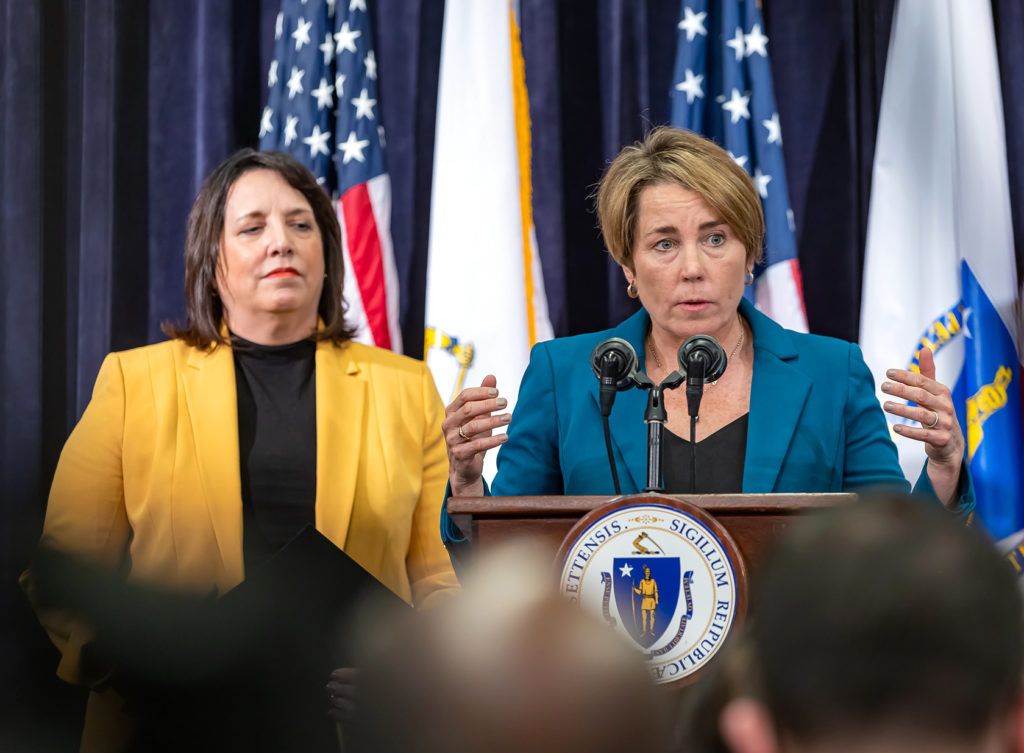Advocates push back on governor’s tax cuts
Groups that fought for Fair Share oppose tax breaks for the wealthy

Governor Maura Healey’s tax proposal, filed March 1, has received mixed reviews from advocacy groups in the coalition that led the campaign for the Fair Share Amendment, which is expected to bring more than $1 billion in additional revenue to the state budget.
In a statement released after the announcement of the Healey administration’s budget, the Massachusetts Budget and Policy Center (MBPC) said that to balance the loss of revenue with the effect on taxpayers, tax cuts should be “well targeted.” Marie-Francis Rivera, who heads the MBPC, said she thinks some of the elements in Healey’s proposal miss that mark.
The proposed tax relief policy comes as Massachusetts will see increased tax revenue through the Fair Share Amendment, which passed in a 52% to 47% vote in a statewide ballot initiative in November. In her first budget, also filed March 1, Healey proposed the creation of a $1 billion Education and Transportation Fund using revenue from the aendment.
“In November of last year,” said Rivera, “the voters said two things: They said that we want our tax system to be more fair, and we believe that it will be more fair if we tax wealthier folks at a higher rate, and that they wanted to see new investments into education and transportation.”
Members of the Raise Up Massachusetts coalition worry that the tax relief proposal, as currently structured, might negate some of the Fair Share Amendment’s effects.
“A solid majority of the voters in November chose a fairer tax system that raises more than a billion dollars in new annual revenue,” a statement from the coalition said. “A billion-dollar permanent tax cut, including these two incredibly regressive policies, would undermine those goals while placing the state at risk for catastrophic budget cuts in future years.”
While the Raise Up Massachusetts members support much of the proposal — such as revamping the state’s child tax credit and adjusting tax policies around housing for renters and seniors — they say other elements, like cuts to the state’s estate tax and short-term capital gains tax would provide tax relief to the state’s wealthier residents while taking away revenue that could otherwise be used to support programs including education, transportation, childcare and housing.
“We are deeply concerned that proposed changes to the estate tax and short-term capital gains tax rate would deliver an enormous windfall to the richest members of our society, while depriving the state of hundreds of millions of dollars in much-needed revenues,” the coalition said in a statement.
As initially proposed, the $742 million tax relief plan also would increase child tax credits and remove the cap on the number of dependents, as well as giving renters the ability to deduct more of the cost of their primary residence and doubling the available tax credit for low-income homeowners and renters aged 65 and older.
If approved, the state’s estate tax system, which applies to someone’s estate following their death, would also be restructured. Currently, estates of more than $1 million are taxed under state law. Under the proposal, estates would need to value $3 million or more to be taxed. In the proposal, the Healey administration suggested that, as one of 12 states with an estate tax, the current system risks older residents and professionals moving away. The new system, the administration suggests, will help keep Massachusetts competitive.
It could also increase the wealth gap, according to Rivera.
Rivera said that a key element of building intergenerational wealth is passing down assets through estates. But with a higher threshold to trigger the estate tax, the wealth gap would grow under Healey’s budget proposal, as wealthier families keep money within their family, rather than some of that serving as revenue to support state programs.
“That’s money that would keep growing and stay in their family, rather than going to support all of the resources that we’re trying to establish for us together as a state,” Rivera said. “Instead of addressing the affordability crisis, that money is sitting in a particular family and growing their family’s wealth.”
Rivera said a state’s tax policy, as a key source of funding for its budget, reflects its morals and priorities.
“Budgets are moral documents; they’re an opportunity to really lean into our values, and budgets are also funded really primarily through state tax revenue,” Rivera said. “So, when we talk about taxes, we always have to think about it in terms of all of the priorities and all of the investments that we can make in our cities and towns across the Commonwealth.”
Along with Healey’s budget, the tax relief plan is currently only a proposal. Lawmakers will continue to debate its structure for a matter of months, something Rivera said is important to keep in mind.
“Whether you’re supportive of it, or are supportive of some of the pieces, or not, we encourage people to reach out to their elected officials, because they’re the next decisionmakers in whether these proposals move forward or not,” Rivera said.






